STUDY: Exploring Franchise Marketing
By Matthew Haller
As a valued partner of Constant Contact, we at the International Franchise Association (IFA) are proud to support their new research efforts to understand how franchise brands are helping their local franchisees achieve marketing success through corporate provided tools for social media, email, SMS and other strategic support. This is one of the incredible benefits of being in franchising – you’re in business for yourself, but not by yourself.
In this report, franchisors and franchisees were asked about their marketing priorities, autonomy, access, barriers to success, and training and support. Their answers reveal significant areas of improvement on communication between the franchisor and franchisee. These insights can improve understanding of how franchisors and franchisees can more effectively use marketing and technology together, improving outcomes across local businesses and their corporate counterparts.
Franchising spans more than 300 industries –from brands just getting their start to some of the most common household names – with reach around the world. Every brand differs in how they centralize and manage brand marketing for individual franchisees – yet it is a key component of brand success. After reading this report, it’s clear that the right mix of access, engagement and flexibility is paramount for franchisors to empower franchisees while still protecting the integrity of their brand.
We hope you find this research useful and look forward to staying in touch about ways to continually improve and strengthen the franchise business model and the countless people it serves.
Matthew Haller is President & CEO, International Franchise Association
# # #
Study on Franchise Marketing: Spotlight on Franchisor and Franchisee Marketing
Effective franchisor-provided marketing tools and training play a critical role in keeping franchisees aligned with the brand, ensuring consistency and competitiveness. Distinctions in their roles, however, give franchisors and franchisees different perspectives and needs when it comes to marketing technology.
Franchise marketing thrives on a strong partnership between franchisors and franchisees – strategically blending a corporate strategy with localized marketing efforts. Franchisors are tasked with the unique challenge of both maintaining market-wide brand reputation while also supporting local franchisee marketing goals.
Managing brand adherence and reputation across multiple markets is a top concern among franchisors, but they also recognize the necessity for customization at the local level. Failure to unify these needs at a strategic level can lead to inconsistent branding, inefficient operations, and missed opportunities for growth.
To better understand how franchises can work to bridge these gaps, we surveyed 239 US and Canada-based marketing decision-makers working for the corporate headquarters of a franchise (referred to as “franchisors” throughout this report) as well as 264 US and Canada-based decision-makers for a franchisee at the local level (referred to as “franchisees” throughout this report). Our data uncovers what both parties seek from franchise marketing and provides a roadmap for how they can drive success together.
1.0 Franchisor Priorities and Motivations
Franchisors are prioritizing audience reach, increasing Return on Investment (ROI), and operational efficiency over franchisee marketing efforts and local collaboration. AI tool expansion and growth into new markets are also significant focuses for one-third of those surveyed, even more so than personalization and their data-driven strategy.
Franchisors may be leaning into AI due to its promising ability to provide scalable, cost-effective ways to drive growth, responding to a perception that personalization and data will require more effort, time, and individual coordination with franchisees.
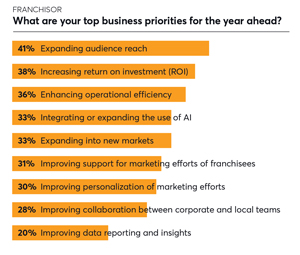
Number of franchise units impacts top priorities.
Franchisors with fewer franchisee units (less than 20 locations) are focused more on growth and generating measurable results than larger franchisors, citing expanding audience reach (42 percent), increasing ROI (40 percent), and enhancing operational efficiency (39 percent) among their top priorities. However, priorities evolve as franchises grow, with larger franchisors placing more of an emphasis on the development of collaboration with franchisees. Mid-size franchisors (20 to 100 locations) prioritize integrating or expanding the use of AI (41 percent), improving support for franchisee marketing efforts (38 percent), and improving corporate and local team collaboration (37 percent). As corporate marketing goes further to “do it with them,” partnerships are fostered that benefit all parties.
Franchisors often prioritize national brand strategy over local marketing support, making collaboration with franchisees a lower priority. However, 95 percent of franchisees agree that it is or would be extremely helpful if corporate headquarters provided localized marketing support for their business.
1.1 Franchisor Priorities and Motivations: Adapting to Diverse and Regional Markets
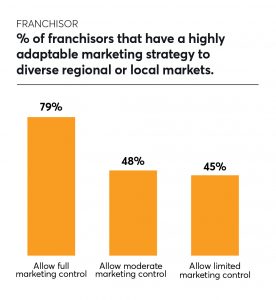 Although 60 percent of franchisors believe that their marketing strategy is highly adaptable to diverse regional and local markets, 40 percent see room for improvement. A clear tension exists along the control-to-freedom continuum: the more a franchisor locks marketing strategy from franchisee customization and input, the less adaptable it becomes to the unique needs of local and regional markets. Franchisors that delegate full marketing messaging responsibility to franchisees are significantly more likely to have a highly adaptable marketing strategy (79 percent) compared to those that allow moderate control (48 percent) and those allowing limited control (45 percent).
Although 60 percent of franchisors believe that their marketing strategy is highly adaptable to diverse regional and local markets, 40 percent see room for improvement. A clear tension exists along the control-to-freedom continuum: the more a franchisor locks marketing strategy from franchisee customization and input, the less adaptable it becomes to the unique needs of local and regional markets. Franchisors that delegate full marketing messaging responsibility to franchisees are significantly more likely to have a highly adaptable marketing strategy (79 percent) compared to those that allow moderate control (48 percent) and those allowing limited control (45 percent).
However, maintaining brand control is imperative. Franchisors must protect brand integrity while also empowering franchisees to execute their own marketing within well-defined guardrails. Striking this balance ensures consistency while allowing for the local flexibility needed to drive engagement and growth. The more franchisors can do to streamline the process of creating from brand standards, the better.
The right technology improves marketing performance.
When franchisors provide the right technology to franchisees, their brands are better equipped to adapt to diverse local and regional markets. Franchisors who are very satisfied with their franchisee marketing technology stack are almost 2x more likely to have an adaptive, best-in-class marketing strategy (83 percent vs. 44 percent).
2.0 Franchisees Need Localized Marketing Tools
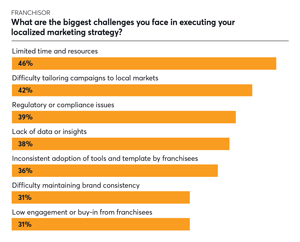 Alongside the role national marketing plays in strengthening brands, franchises need effective localized marketing. Franchisees are owned and operated locally and have unique insights as well as a great individual incentive to plan local marketing campaigns. However, it is critical for franchisors to provide the right tools to support their needs.
Alongside the role national marketing plays in strengthening brands, franchises need effective localized marketing. Franchisees are owned and operated locally and have unique insights as well as a great individual incentive to plan local marketing campaigns. However, it is critical for franchisors to provide the right tools to support their needs.
In executing localized marketing strategy, limited time and resources is a top challenge cited by franchisors, followed by challenges in tailoring campaigns and addressing regulatory issues.
Technology can play a critical role in extending the limited time and resources plaguing nearly half of franchisors. Incorporating dynamic localization technology, distributing templates, and implementing other tactics designed to scale local efforts and make it easier for franchisees to execute their strategy can be a game-changer. Since inconsistent adoption of tools and templates by franchisees is mentioned as another significant challenge, finding the right mix of marketing tools that appeal to franchisees is necessary for success.
2.1 Elevate Franchisee Marketing with Better Data
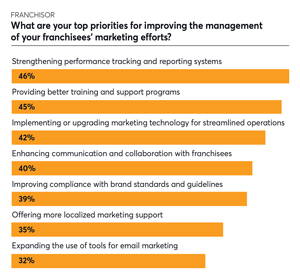 To improve the management of franchisee marketing efforts, franchisors prioritize stronger performance tracking and reporting systems, providing better training and support programs, and updating marketing technology for streamlined operations. While few franchisors feel that improving their own reporting and data at the corporate level needs to be prioritized, as demonstrated earlier in the report, franchisors are, in fact, eager to strengthen insight and analytics at the franchisee level. 46 percent report performance tracking and reporting systems are a top priorities for improving the management of franchisee marketing efforts. So while franchisors are generally confident in data and reporting at the corporate level, their concern lies in the ROI and brand consistency of local-level marketing.
To improve the management of franchisee marketing efforts, franchisors prioritize stronger performance tracking and reporting systems, providing better training and support programs, and updating marketing technology for streamlined operations. While few franchisors feel that improving their own reporting and data at the corporate level needs to be prioritized, as demonstrated earlier in the report, franchisors are, in fact, eager to strengthen insight and analytics at the franchisee level. 46 percent report performance tracking and reporting systems are a top priorities for improving the management of franchisee marketing efforts. So while franchisors are generally confident in data and reporting at the corporate level, their concern lies in the ROI and brand consistency of local-level marketing.
Leverage technology to improve franchise marketing management.
Choose technology that gives franchisees the freedom to focus on local, relevant content and design without worrying about altering or diluting your branding and messaging. With certain tools, such as those of platforms like Constant Contact, franchisors get enterprise ready access, control, and flexibility that includes tools for social media marketing, email, SMS, events, and more in one marketing platform. Templates, automation, and AI content generation are catered to your business and free training is available to all end users.
2.2 Franchisees Need Localized Marketing Tools: Franchisees Want More Support
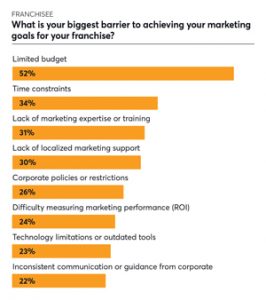 Two-thirds (64 percent) of franchisees say that marketing their business is a high priority for them, another 32 percent say it is a moderate priority. But faced with limited resources and budgets, franchisees are looking for more marketing expertise, training, and support to execute on localized efforts.
Two-thirds (64 percent) of franchisees say that marketing their business is a high priority for them, another 32 percent say it is a moderate priority. But faced with limited resources and budgets, franchisees are looking for more marketing expertise, training, and support to execute on localized efforts.
Franchisee Insight
Despite technology limitations ranking low on their list of top challenges, only 39 percent of franchisees feel strongly that they are being provided with the right marketing tools to effectively address the unique needs of their specific location. This presents a clear opportunity for franchisors to enhance support, providing more tailored resources and strategies that empower franchisees to drive local success while maintaining brand consistency.
2.3 Franchisees Need Localized Marketing Tools: Marketing Tactics Franchises Value
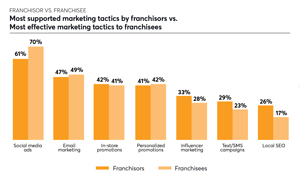 When providing marketing support to franchisees, corporate is focused on social media advertising, email marketing, and in-store promotions. This seems to track with which tactics franchisees value most for marketing their business. When comparing what franchisors are prioritizing to provide their franchisees and what franchisees find to be most effective for their business, we see franchisees placing more value on social media ads, email marketing, and personalized promotions than franchisors.
When providing marketing support to franchisees, corporate is focused on social media advertising, email marketing, and in-store promotions. This seems to track with which tactics franchisees value most for marketing their business. When comparing what franchisors are prioritizing to provide their franchisees and what franchisees find to be most effective for their business, we see franchisees placing more value on social media ads, email marketing, and personalized promotions than franchisors.
There is also a gap between corporate and local teams when it comes to the perceived value of influencer marketing, text/SMS, and local SEO, with franchisors putting more priority on these than franchisees. Typically, more advanced marketing tactics reside with franchisors, who undertake these marketing tactics for the mutual benefit of franchisors and franchisees.
Franchisee Insight
Mature or declining franchisees (those that are fully developed with little room for expansion or experiencing reduced growth) are significantly more likely than others to report that in-store promotions have been most effective for their business (50 percent vs. 40 percent), while growing and established businesses are more likely to feel that social media ads are most effective. Digital channels such as social media are becoming more and more essential for emerging and growing franchises.
3.0 Measuring Success
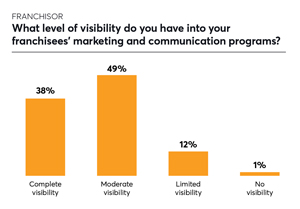 Visibility into franchisee marketing efforts enables decision-making that is more closely aligned with marketing strategy. When franchisor visibility is poor, their ability to collaborate effectively with franchisees, share resources, provide training, and incorporate best practices learned from other local contexts inside the franchise deteriorates.
Visibility into franchisee marketing efforts enables decision-making that is more closely aligned with marketing strategy. When franchisor visibility is poor, their ability to collaborate effectively with franchisees, share resources, provide training, and incorporate best practices learned from other local contexts inside the franchise deteriorates.
Only 38 percent of franchisors report having complete visibility into their franchisees’ marketing and communications programs, but this group sees significant benefits when compared to those who have less visibility into this data.
There is room for improvement in franchisor marketing technology and insight. Just 37 percent of franchisors surveyed say their tools are very effective at helping them track marketing performance. Similarly, only 40 percent report they have extensive ability to make effective marketing decisions based on the data they have from franchisees Gain visibility for better results. Having access to tangible data at the local level can be incredibly valuable to franchisors for formulating localized and corporate brand marketing strategies.
Those with complete visibility:
- Make more effective marketing decisions 63 percent vs. 25 percent say they can make effective marketing decisions based on data from their franchisees to a great extent.
- Can better track marketing performance 65 percent vs. 19 percent say their tools are very effective at tracking marketing performance.
- Are more satisfied with their technology 65 percent vs. 23 percent say they are very satisfied with franchisee marketing technology.
3.1 Measuring Success: Preferred Metrics to Gauge Performance
 For franchisors, metrics provide important feedback and help franchises pivot to match current market demands. Data-driven franchises change strategy and tactics in response to measurable outcomes. Nearly three-quarters of franchisors say that sales is the most effective metric used to measure marketing success. Customer retention is also high on the list at 65 percent.
For franchisors, metrics provide important feedback and help franchises pivot to match current market demands. Data-driven franchises change strategy and tactics in response to measurable outcomes. Nearly three-quarters of franchisors say that sales is the most effective metric used to measure marketing success. Customer retention is also high on the list at 65 percent.
Lead generation is highly valued by nearly half of those surveyed. New and growing franchisors are slightly less likely than more mature franchisors to rely on sales as a metric for measuring success. Instead, growing franchisors rely more heavily on engagement, measured by click-through and open rates. Meanwhile, the most mature franchisors rely on sales and customer retention more than their less mature counterparts.
4.0 Franchisor Control vs. Franchisee Autonomy
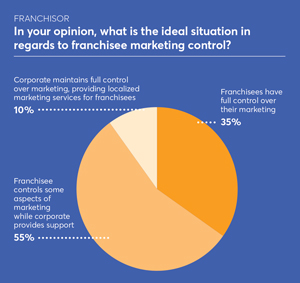 Centralizing marketing control at the corporate level protects brand consistency, provides access to advanced marketing technology tools, and ensures effective messaging across all franchisees. Virtually all franchisors (95 percent) say that maintaining control of franchisee marketing tools, branding, and messaging is important, with 62 percent describing marketing control as extremely important. Franchisor control varies, with 48 percent granting franchisees a moderate level of autonomy and 39 percent full autonomy. Over half of franchisees (53 percent), however, believe their marketing is fully autonomous – suggesting that some franchisees may think they have more control than they actually do and are unaware of backend guardrails.
Centralizing marketing control at the corporate level protects brand consistency, provides access to advanced marketing technology tools, and ensures effective messaging across all franchisees. Virtually all franchisors (95 percent) say that maintaining control of franchisee marketing tools, branding, and messaging is important, with 62 percent describing marketing control as extremely important. Franchisor control varies, with 48 percent granting franchisees a moderate level of autonomy and 39 percent full autonomy. Over half of franchisees (53 percent), however, believe their marketing is fully autonomous – suggesting that some franchisees may think they have more control than they actually do and are unaware of backend guardrails.
Franchisee Insight Franchisees with full control over their messaging are significantly more satisfied with their level of marketing autonomy than those with moderate, limited, or no control. 61 percent of those with full control over messaging report being very satisfied, compared to just 38 percent of those with moderate and 20 percent of franchisees with limited or no control.
4.1 Franchisor Control vs. Franchisee Autonomy: Set Controls to Ensure Brand Consistency
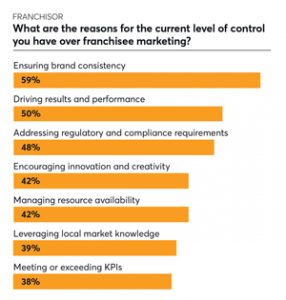 Franchisors set marketing control levels to enhance performance and meet regulatory and compliance requirements across their franchise network. However, the primary reason for enforcing a specific level of control is ensuring brand consistency (59 percent).
Franchisors set marketing control levels to enhance performance and meet regulatory and compliance requirements across their franchise network. However, the primary reason for enforcing a specific level of control is ensuring brand consistency (59 percent).
Within specified guardrails, franchisees can customize their marketing, allowing them to add needed localization and context. Franchisors know that their franchisees need room to adapt marketing messages to strengthen engagement with local audiences, so a balanced approach with sufficient autonomy to accomplish this is essential.
Franchisors weigh innovation with brand integrity as they delegate marketing control. Marketing control at the corporate level is common, but some franchisors also permit part or full marketing autonomy for franchisees. Those that allow full marketing control for their franchisees are significantly more likely to be doing so to encourage innovation and creativity (50 percent) and manage resource availability (50 percent) than those that allow less control. Those that allow limited or no control are heavily focused on ensuring brand consistency (71 percent) and driving results and performance (65 percent).
4.2 Franchisor Control vs. Franchisee Autonomy: Balancing Autonomy and Control Fuels Franchisee Empowerment
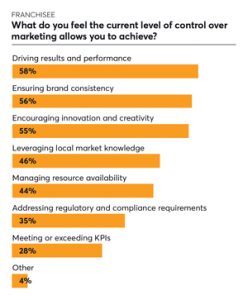 Overall, a majority of franchisees are confident that they have enough control over their marketing to succeed, showing they are generally happy with the autonomy provided through corporate-given marketing tools.
Overall, a majority of franchisees are confident that they have enough control over their marketing to succeed, showing they are generally happy with the autonomy provided through corporate-given marketing tools.
Franchisee Insight
Notably, franchisees that perceive more control and autonomy are more confident they have the leverage needed for creativity, innovation, and brand knowledge, while safeguarding brand consistency as a whole. This suggests that striking the right balance between control and autonomy not only strengthens franchisee confidence but also fosters creativity, innovation, and a deeper understanding of the brand. When franchisees feel empowered within clear brand guidelines, they are better equipped to drive local engagement while maintaining overall brand integrity.
4.3 Franchisor Control vs. Franchisee Autonomy: Use Templates to Boost Consistency and Efficiency
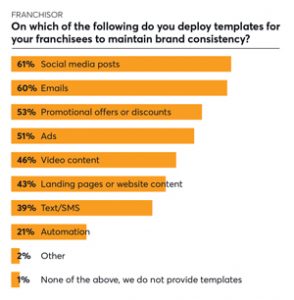 To support franchisee productivity and maintain brand consistency, templates and pre-built campaigns are a popular marketing control that give franchisors direction over marketing messaging. Franchisors most commonly supply their local franchisees with social media post templates (61 percent) and email templates (60 percent). One in five (21 percent) provide franchisees with automation templates to direct customer journeys. With time constraints and resources a major issue among franchisees, automation features will likely become more important to marketing teams over time as customer touchpoint-triggered automation campaigns continue to grow in relevance.
To support franchisee productivity and maintain brand consistency, templates and pre-built campaigns are a popular marketing control that give franchisors direction over marketing messaging. Franchisors most commonly supply their local franchisees with social media post templates (61 percent) and email templates (60 percent). One in five (21 percent) provide franchisees with automation templates to direct customer journeys. With time constraints and resources a major issue among franchisees, automation features will likely become more important to marketing teams over time as customer touchpoint-triggered automation campaigns continue to grow in relevance.
Franchisee Insight
Ninety-one percent of franchisees say their business would benefit from more frequent updates to marketing templates and campaign options provided by their franchisor. Top-tier brand consistency requires fresh marketing templates and campaigns that are ready for franchisees to deploy. Franchisees are eager to leverage these templates, however just 35 percent of franchisors update their marketing templates and campaigns weekly. 41 percent report updating monthly and 19 percent update quarterly.
Without frequent updates, franchisees may feel restricted in their pursuit of local marketing goals and building channel engagement effectively.
5.0 Investing in Marketing Technology to Stay Competitive
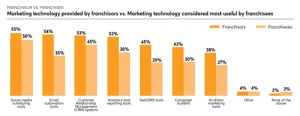 New marketing technologies incorporating AI and automation, advanced analytics, and other features are encouraging franchises to consider upgrades and new martech investments. A 62 percent majority of franchisors say investment in new marketing technology is very likely in the coming year and a third (33 percent) agree that it is somewhat likely. As marketing strategies evolve in alignment with organizational goals, new features become more relevant and offer the prospect of enhanced outreach and measurement capabilities.
New marketing technologies incorporating AI and automation, advanced analytics, and other features are encouraging franchises to consider upgrades and new martech investments. A 62 percent majority of franchisors say investment in new marketing technology is very likely in the coming year and a third (33 percent) agree that it is somewhat likely. As marketing strategies evolve in alignment with organizational goals, new features become more relevant and offer the prospect of enhanced outreach and measurement capabilities.
Both types of stakeholders – franchisors and franchisees – see value in their existing marketing technologies, with franchisors reporting slightly higher rates of satisfaction with their franchisees’ martech than the franchisees themselves (40 percent vs. 34 percent say they are very satisfied).
Generally, the tools franchisors provide are highly valued by franchisees. The most common technologies provided by franchisors to their franchisees are social media scheduling tools, email automation tools, CRM systems, and analytics and reporting tools. These align with the tools that franchisees find to be most effective.
5.1 Investing in Marketing Technology to Stay Competitive: Franchisee Success Requires Flexible, User-Friendly Martech
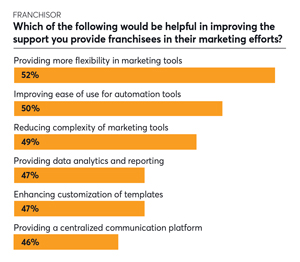 For marketing tools to help franchisees achieve engagement goals, franchisors need tools offering the right combination of access, control, and flexibility. Brand consistency is a need weighed against flexibility and freedom for franchisees.
For marketing tools to help franchisees achieve engagement goals, franchisors need tools offering the right combination of access, control, and flexibility. Brand consistency is a need weighed against flexibility and freedom for franchisees.
Martech with limited flexibility for marketers locks marketing operations and introduces friction in the franchisor-franchisee relationship, rather than streamlining and strengthening collaboration. The data shows franchisor support for improving system flexibility and making automation tools easier for franchisees to use.
Reducing marketing tool complexity would also help nearly half of those surveyed – specifically, simplifying automation. Implementing automation and AI tools augments team productivity and improves marketing efficiency.
5.2 Investing in Marketing Technology to Stay Competitive: AI-Driven Marketing Improves Franchisee Results
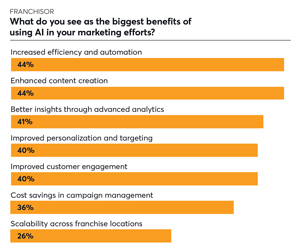 With AI marketing technologies developing and evolving quickly, franchisors want to empower franchisees as long as appropriate controls and oversight are implemented. The vast majority (94 percent) of franchisors are more comfortable allowing franchisees to use AI for marketing if corporate can oversee or control AI outputs.
With AI marketing technologies developing and evolving quickly, franchisors want to empower franchisees as long as appropriate controls and oversight are implemented. The vast majority (94 percent) of franchisors are more comfortable allowing franchisees to use AI for marketing if corporate can oversee or control AI outputs.
Franchisors feel that using AI increases efficiency and automation, enhances content creation, and provides better insights through advanced analytics in their marketing efforts.
Franchisee Insight
Franchisees have a high appetite for AI. 87 percent of franchisees agree that more extensive use of AI tools would improve their marketing performance. Franchisors who implement new automation technologies will likely find broad support among franchisees.
5.3 Investing in Marketing Technology to Stay Competitive: Corporate Support for Franchisee AI
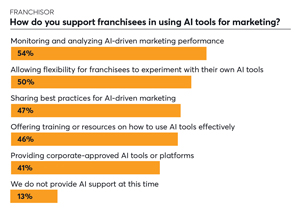 AI adoption is still early and growing among franchises, but most franchisors provide franchisees with AI support. In fact, only 13 percent of franchisors currently do not provide support in the use of AI for franchisees.
AI adoption is still early and growing among franchises, but most franchisors provide franchisees with AI support. In fact, only 13 percent of franchisors currently do not provide support in the use of AI for franchisees.
Since AI tools have demonstrated potential for marketing use, franchisors are on board with encouraging franchisees to use AI and are ready to share knowledge and lessons learned. Over half (54 percent) of franchisors say they monitor and analyze AI-driven marketing performance while 50 percent allow flexibility for franchisees to experience AI tools of their choosing. Nearly half share best practices for AI-driven marketing with their franchisees.
Franchisor oversight is common when it comes to the use of AI tools. While over one-third (36 percent) of franchisors allow franchisees free rein over their use of AI tools, nearly half only permit tools that have been pre-approved. Another 10 percent impose limited access under corporate oversight, and just 5 percent prohibit AI tools entirely.
Empowering Franchisees with Smart Martech Drives Local Success and Brand Integrity
When franchisors empower franchisees through martech that emphasizes ease-of-use and sufficient support, franchise marketing adapts to local conditions while protecting the overall brand. What franchisees need to be successful is for franchisors to:
- Establish smart guardrails
- Provide relevant training
- Share updated templates and automations for franchisees
Franchisors should collaborate with franchisees in ways that promote partnership and encourage creativity and innovation. Technology that empowers franchisees instead of constraining them positions franchises to stay competitive in their local markets. Franchisor control and reporting is an essential facet of franchisee marketing and is enabled through effective access levels and backend functionality.
Study Methodology. Using a custom online questionnaire, Constant Contact, in partnership with Ascend2 Research, surveyed a total of 503 marketing decision-makers working for franchisors (239 participants) and franchisees (264 participants) throughout the United States and Canada. Individuals surveyed represent businesses across all industries and company sizes. The survey was conducted in January 2025. Constant Contact simplifies digital marketing for franchisors with an all-in-one platform for email, social, landing pages, and more. Whether you’re an emerging brand or an established system, franchisors decide how much control to maintain at the top while giving franchisees flexibility for local marketing success.




